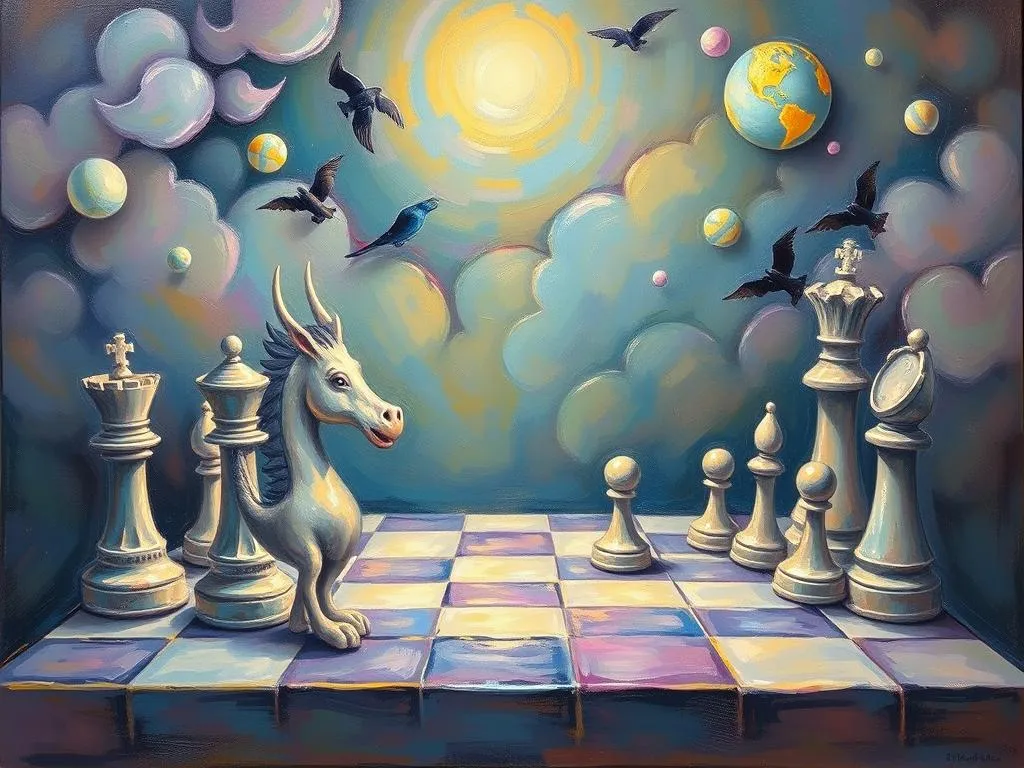
Introduction
Dreams are fascinating windows into our subconscious, often revealing our inner thoughts, feelings, and conflicts. Among the myriad of dream themes, chess stands out as a particularly intriguing symbol. Chess dreams can invoke a range of emotions and thoughts, from strategic planning to complex interpersonal dynamics. Such dreams are relevant not only because of their intellectual symbolism but also due to their metaphorical representation of life’s challenges. The imagery of chess—a game that requires foresight, strategy, and careful consideration—invites us to explore our own life choices and the paths we navigate. In this article, we will delve into the symbolism and meaning behind chess dreams, examine various scenarios, and provide insights on how these dreams might connect to our waking lives.
Symbolism and Meaning
At its core, chess is a game of strategy and intellect, and dreaming about chess often reflects our mental state and the challenges we face. One of the most significant symbols in chess dreams is the board itself. The chessboard can represent the landscape of our lives, where each square symbolizes a choice or a direction we can take. The dynamics of the game—how we move our pieces—might mirror our decision-making processes in real life.
The pieces in chess also hold considerable symbolism. The king represents authority and responsibility; dreaming of protecting or losing the king may indicate feelings of vulnerability or the weight of leadership in our waking life. The queen, the most powerful piece, can symbolize feminine energy, creativity, and emotional strength. If the queen is central in your dream, it might reflect your own empowerment or the influence of a strong female figure in your life.
The pawns often symbolize the mundane aspects of life or the small steps we take towards bigger goals. If you find yourself dreaming about pawns, it could be an indication of how you perceive your own contributions and progress in life. Are you feeling like a pawn, or do you see potential for growth and advancement?
Additionally, the act of playing chess in a dream can signify an inner struggle or conflict. The moves made during the game may echo decisions you are grappling with in your waking life. If you are playing against someone, this could point to a rivalry or competition in your life, either personal or professional. Conversely, playing against yourself might represent self-reflection or an internal battle regarding a choice or direction.
The outcome of the game also carries weight in dream interpretation. Winning might symbolize success and confidence in your current endeavors, while losing could reflect feelings of defeat, insecurity, or unresolved issues. Consider how you feel during and after the game in your dream; these emotions can provide further insights into your current mindset.
Key Scenarios and Variations
Chess dreams can manifest in numerous scenarios, each offering its own unique interpretation. One common variation is playing chess with someone you know. This could indicate a real-life relationship dynamic, highlighting competition, collaboration, or unresolved tension between you and that individual. If you find yourself consistently losing to this person in your dream, it may suggest that you feel overshadowed or challenged by them in your waking life.
Alternatively, dreaming of playing chess with a stranger or in an unfamiliar setting might signify feelings of uncertainty or a lack of control. You may be navigating new situations or relationships that feel foreign or challenging. In this context, the chess game could symbolize your attempts to strategize and adapt to these changes.
Another scenario involves observing a chess game rather than participating. This could indicate that you are taking a step back from a situation in your life, perhaps feeling like an outsider. Such a dream may encourage you to reflect on your role in your personal or professional life. Are you active in your decisions, or are you merely watching events unfold?
If you dream of a chess game that abruptly ends, it could symbolize unfinished business or unresolved conflicts. This abruptness may prompt you to evaluate what issues in your life remain unresolved and how you can address them.
Dreams can also feature unusual chess pieces or rules. For instance, if you find yourself playing with pieces that change or have unique abilities, this might suggest that you are feeling empowered to change the dynamics of your life. It can also indicate that you are exploring new strategies or perspectives.
The environment in which the chess game takes place can also alter its meaning. A grand, open tournament hall might symbolize ambition and competition, while a dimly lit room might evoke feelings of secrecy or hidden agendas. The atmosphere influences the emotional context of the game and can provide clues about your current mindset.
Real-Life Connections and Takeaways
Connecting chess dreams to real-life situations can serve as a powerful tool for self-reflection. To gain deeper insights, consider the following questions: What decisions are you currently facing? Are there relationships in your life that resemble a chess game? Reflecting on these aspects can help you decode the messages your dreams may be conveying.
Moreover, if you find yourself frequently dreaming about chess, it may be beneficial to assess your strategic thinking in daily life. Are you being proactive in your decisions, or are you simply reacting to circumstances? This realization can lead to a more intentional approach toward the challenges you face.
One practical piece of advice is to keep a dream journal. Write down your chess dreams in detail, noting the emotions you experienced and the context of the dream. Over time, patterns may emerge that reveal underlying themes in your life. This practice can enhance your self-awareness and help you identify areas where you may need to strategize or take action.
Engaging in activities that promote strategic thinking, such as puzzles or games, can also serve as a means to channel the energy from your chess dreams into productive outlets. These activities may help you process your thoughts more clearly and develop new strategies for approaching life’s challenges.
Lastly, consider seeking feedback from those around you about any interpersonal dynamics that may be affecting you. Sometimes, an outside perspective can shed light on relationships or situations that might feel like a chess game, allowing you to navigate them more effectively.
In conclusion, chess dreams are rich in symbolism and meaning, offering profound insights into our lives and relationships. By analyzing the symbols, scenarios, and emotions within these dreams, we can uncover valuable lessons about our decision-making processes, interpersonal dynamics, and personal growth. As you reflect on your own chess dreams, remember to embrace the journey of self-discovery they offer, allowing the wisdom they impart to guide you in your waking life.







